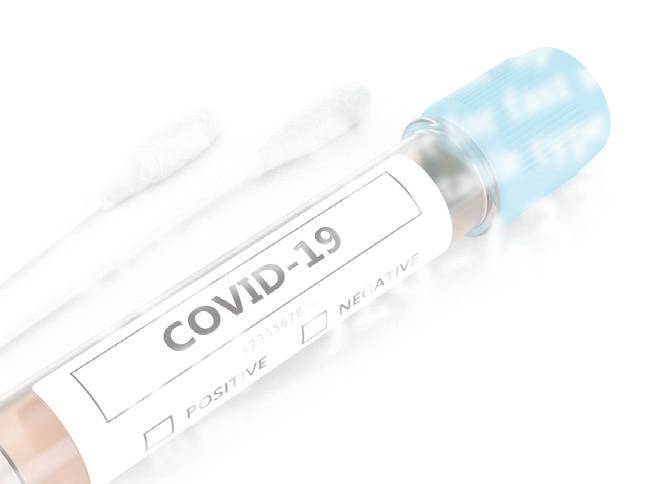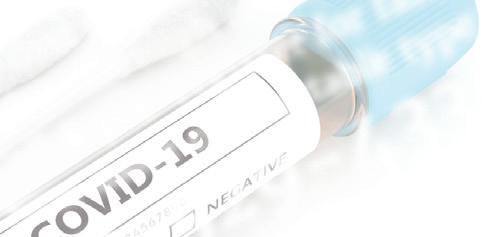
3 minute read
What kind of test is best for my situation?
There are two types of testing associated with COVID-19. One suggests you have the virus, and the other suggests you have been exposed to it. It is important to know the difference when assessing what kind of test you need.
Swab test
Advertisement
Also called viral testing, this test is done by swabbing the nose or mouth. A positive test is generally a very reliable indicator the virus is present and is the recommended test to determine if someone is currently infected. Terminology: • Positive test: Suggests you have COVID-19 • Negative test: Suggests you do not have COVID-19, but other factors must be considered such as the timing that the test is done Limitations: • There must be enough virus present for the test to detect it. The virus level may not be high enough for a test to be positive for several days after the person was exposed. People who have COVID-19 and show symptoms typically have high enough levels of the virus in their bodies for a test to be positive. • A negative test does not guarantee a person does not have COVID-19. A person who is tested immediately after he or she is exposed and infected, when the amount of virus in the body is still low, will have a negative test. However, that person will still have enough virus to infect others soon after, even before he or she starts showing symptoms of COVID-19. If you are instructed to quarantine after an exposure to a person who has COVID-19, remain isolated for the entire quarantine period, even if you test negative.
CORONAVIRUS TESTING TESTING LOCATIONS
Testing is generally not recommended in the clinical setting for people without risk factors for or symptoms of COVID-19 infections. Public health testing clinics in the community will test everyone, regardless of risks or
» Testing is Open to all interested
symptoms.
Blood, antibody or serology test
by a venipuncture or a finger prick and detects antibodies produced as the body fights off the virus. These tests are more useful for determining if someone has been infected with COVID-19 in the past. Antibody tests are not recommended to determine if someone is currently infected. Terminology: • Positive test: Suggests you have had COVID-19 in the past • Negative test: Suggests you have not been infected with COVID-19 in the past, but other factors must be considered such as the timing the test is done Limitations: • It can take 1-3 weeks after infection occurs for your body to produce enough antibodies for the test to detect them. You may be currently infected even if you have a negative antibody test. • Health professionals are still learning about antibody tests. Currently, doctors and scientists do not know whether antibodies detected by these tests will protect people against becoming infected in the future. Until we learn more, no one should consider themselves immune to COVID-19 infection based on these results.
You should still take precautions to protect yourself against future infections, even if your antibody test is positive. Source: S.C. Department of Health and Environmental Control
Sandhills Medical Foundation, Inc. CALL FOR UP-TO-DATE


This testing is done using a sample of blood collected
» No cost to you: No fees or co-pays » Drive-through or walk-up format » Call & pre-register for fast service » New more comfortable type test 877-529-4339 TO REGISTER & DETAILS












